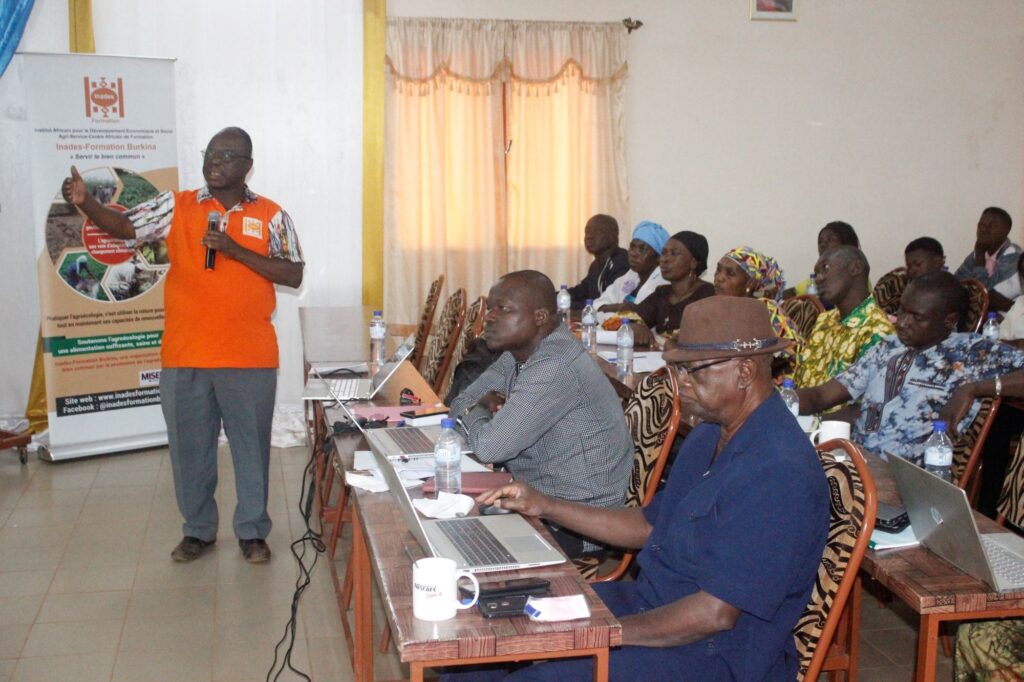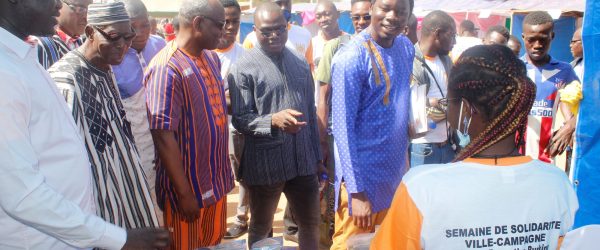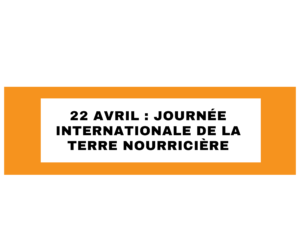Inades-Formation Burkina organized from December 5 to 11, 2022 in Dédougou, chief town of the Boucle du Mouhoun region, an event called the Week of City-Countryside Solidarity. Thematic workshop, exhibition and sale of local food products were the main highlights of the event. These activities were carried out within the framework of the Conscience AlimenTERRE Campaign for an adequate, healthy and sustainable food supply for the populations.
The first edition of the Urban-Rural Solidarity Week was organized with the objective of strengthening the links of solidarity between actors concerned with sovereignty food from the field to the plate. It was a question of presenting the knowledge and know-how of family farms around sovereignty food, raising awareness of the interest of the populations on the consumption of sovereignty food, putting in contact farmers with potential individual and institutional buyers, sharing the results of research and innovation in agro-ecology. The event brought together producers, processors, restaurant owners, administrative, political, customary and religious authorities, representatives of government technical services, researchers, students, consumers, etc.
Thematic workshop
One of the major activities of the Urban-Rural Solidarity Week was the thematic workshop that took place on December 10, 2023 in the Monseigneur Jude Bicaba room of the Benkagni Center of Dédougou. It was a framework for information and exchange on various themes related to the objectives of healthy, sufficient and sustainable food for all. “The general theme of the workshop was ” What contributions can rural and urban actors make to ensure sufficient, healthy and sustainable food? The introductory communication on this theme was presented by Dr. Soungalo Soulama, Permanent Secretary of the National Commission for the Management of Plant Genetic Resources (SP/CONAGREP).
Following the introductory presentation, four sub-themes were also presented. Theme 1 entitled “Valorization of farmers’ seeds: challenges and issues in a context of security crisis” was addressed by three speakers: Somda Samuel from Inades-Formation Burkina, Dr Soulama Soungalo and Sanou Clovis from the West African Committee for Farmer Seeds (COASP Burkina). The communication on theme 2 (Production of bio-pesticides based on neem leaves and seeds: an alternative to the dangers of synthetic chemical pesticides) was presented by Dr. Zongo Adama of the University of Dédougou. Regarding theme 3, which was formulated as follows Levers and obstacles to the development of local potential around the food of sovereignty, what alternatives for development? The presentation was made by Dr. Désiré Jean Pascal Lompo, also from the University of Dédougou. Theme 4 (Realization of the right to adequate food and food sovereignty: state of play, challenges and perspectives in Burkina Faso) was addressed by Ollo Emile Nanwinson KAMBOU.

The presentations on each of the four themes were followed by discussions. Workshop participants were given the floor to ask questions and make comments. Most of those who took the microphone, praised the initiative of holding the workshop that allowed them to understand the issues related to healthy and sustainable food for populations. The students from the University of Dédougou who took part in the workshop were particularly captivated by the presentations on bio-inputs and farmers’ seeds.
The Fair
The exhibition-sale of local food products was one of the central activities of the Week of Solidarity City-Country. This activity took place on December 10 and 11, 2022 at the space called Melons station in Dédougou. The opening ceremony presided over by the President of the special delegation of Dédougou was marked by speeches, an official visit of the stands and a tasting session. For the speeches, the participants in the opening ceremony listened in turn to the representative of the canton chief, the representative of the president of the Board of Directors of Inades-Formation Burkina and the president of the special delegation of Dédougou. In his speech, he praised the initiative of holding the solidarity week in Dédougou in order to promote family farming and sufficient, healthy and sustainable food for all based on local products. ” The international context marked by multiple wars has led to a food crisis around imported food products and this strongly challenges us all on the need to value our local food products to achieve a real food sovereignty “Dieudonné Tougfo, president of the special delegation of Dédougou, emphasized.
Following the various speeches, there was the official visit of the stands by the authorities and the guests at the opening ceremony of the fair. About twenty stands were set up on the fairgrounds. One could find farmer seeds, bio inputs (pesticides and natural fertilizers), agroecological crops, processed agricultural products (fonio, corn, sesame, cassava, rice, sesame cookies, small millet lumps, cowpea cakes, cassava wine, rice couscous, papaya jam, etc.). They congratulated and encouraged the exhibitors for their efforts and commitment to ensure sufficient, healthy, sustainable and local food for all. At the end of the official visit of the stands, there was a tasting session of local dishes based on fonio, small millet, zamné, cowpeas, corn, etc.
The fair brought together about thirty exhibitors from different localities of the Boucle du Mouhoun region. We can mention: Djibasso, Nouna, Passakongo, Dédougou, Safané, Tchériba, etc. For two days, they were able to present and sell their products to the public who came to the exhibition area. This activity was an opportunity for producers, processors and restaurant owners to see other experiences and to seize immediate, short and medium term opportunities for the sale of their products. ” This fair allowed me to discover new products, to build relationships and to get new customers. This is satisfying for me “Ouattara/Badio Fatoumata, a food processor in Dédougou, told us. Bako/Blégnin Djènèba, who came to the Solidarity Week fair for the bio-inputs exhibition and sale, said: ” I was able to show my products to the visitors and I managed to make some sales. This fair also allowed me to meet other producers as well as processors and restaurant owners for interesting partnerships “.
The program of the first edition of the Urban-Rural solidarity week in Dédougou also included the organization of a training workshop for producers on seed control of farmers’ seed varieties, the production of a radio program and a visit to local authorities. This first edition of the Urban-Rural Solidarity Week was organized with the financial support of Misereor and Inter Pares, partners of Inades-Formation Burkina. The second edition will take place in November 2023.
Patrice DA/ Inades-Formation Burkina










